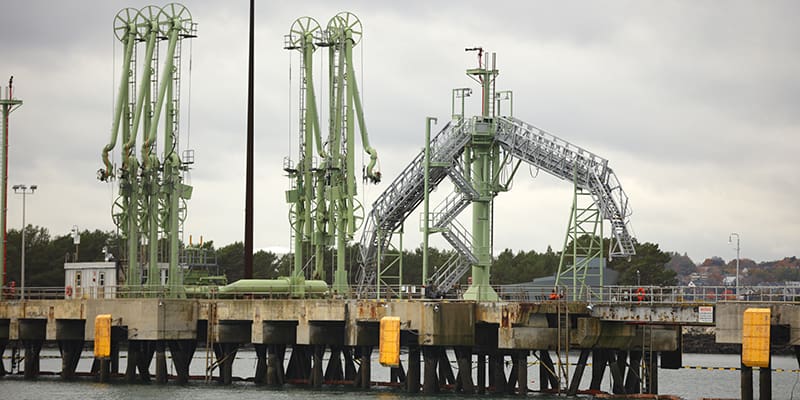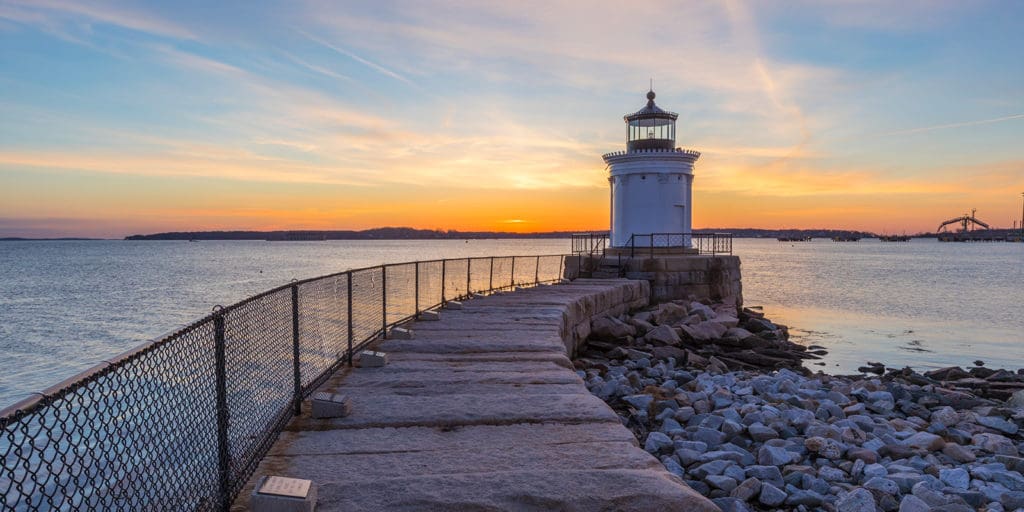Update July 15, 2021: After six years, the Portland Pipeline Company has given up its fight to import tar sands oil from Canada and through the South Portland waterfront. The company had challenged the city’s 2014 Clear Skies Ordinance – which prohibits the bulk loading of crude oil into tankers. Per the Portland Press Herald:”The dismissal follows the city’s victories in U.S. District Court in Portland and the Maine Supreme Judicial Court, as well as an amicus brief filed by the Biden administration last month supporting the city’s stance that the ordinance doesn’t violate the Constitution, federal laws or foreign policies.”
CLF has stood with the City and our long-time ally, resident-led Protect South Portland, since the start of this fight. Keep reading to learn more about what was at stake and the local heroes who refused to give up, no matter how long the odds.
Perched on the edge of the Fore River, South Portland’s Bug Light Park offers visitors a spectacular view of Maine’s Casco Bay.
Until recently, that view might also have included a massive oil tanker unloading its cargo for transport along the Portland-Montreal Pipeline, which starts at the park’s edge. Today, however, the pipeline terminal sits idle, a testament to the power of people to stand up to big money and corporate interests.
“This is a story of local people from a small town standing up against Big Oil, period,” says CLF Maine Director Sean Mahoney.

Over seven decades, the 236-mile pipeline pumped more than five billion barrels of oil through Maine, New Hampshire, and Vermont to Montreal. But after the surge in Alberta tar sands oil, its flow dropped to a trickle.
As early as 2008, the Portland Pipe Line Company began exploring reversing the pipe’s flow. The idea: to pump tar sands oil from Montreal to the South Portland terminal for export. In 2013, word spread that the company – by then owned by ExxonMobil, Suncor, and Imperial Oil – might be preparing to move the plan forward. The news prompted hundreds of people to march against the proposal on a frigid January day.
The march served as a wake-up call for South Portland city leaders and many residents. Soon after, a dozen neighbors gathered in a local living room to discuss how they could rally residents to attend an upcoming meeting on the project at the city Community Center. Ultimately, 400 people came to the meeting, but, while emotions ran high on both sides, no resolution was put forward.
The concerns that drew together those opposed to the proposal were many, says MJ Ferrier, who lives barely a block from the terminal. The aging pipeline passes through rivers, lakes, and wildlife areas, she says, including over tributaries flowing into Sebago Lake, which provides drinking water to 20 percent of Maine’s population. A rupture or spill of tar sands oil – like the million gallons that fouled Michigan’s Kalamazoo River in 2010 – would devastate wildlife and threaten drinking water.
What’s more, reversing the pipeline would require building two 70-foot-tall smokestacks, which would spew toxic fumes into densely populated neighborhoods nearby.
Determined to stop the pipeline, the neighbors organized as Protect South Portland. Opposing the pipeline meant standing up to some of the biggest names in the oil industry. But Protect South Portland was undaunted, going door to door to build support for a referendum that would stop a reversal from ever becoming a reality.
“There was a lot of real determination, and it built more and more momentum as we went along,” recalls Ferrier. Protect South Portland soon developed into a network of more than 1,000 people who gave countless evenings and weekends to get out the vote. “People stepped up to the plate over and over to stuff envelopes, knock on doors, whatever was needed,” says Ferrier. “There were retirees, students, and children who came with their parents.”
At the same time, the American Petroleum Institute was pouring money into defeating the referendum, shelling out more than $700,000 to sow division in the small coastal city. In November of 2013, the grassroots referendum was defeated by fewer than 200 votes out of 8,000 cast.

That close result, however, galvanized city leaders. The City Council formed a committee to study the issues and draft an ordinance to ensure that any waterfront construction meshed with the City’s management plan. CLF’s Mahoney, having tracked the referendum vote closely, now became involved directly as the effort entered the legal realm.
Mahoney anticipated that any move by the City would be disputed in court, so he worked with the committee to write an ordinance that was legally sound and could survive a challenge.
While CLF and the committee did their work, Protect South Portland continued their own: educating residents and shoring up support.
The committee’s work resulted in the Clear Skies Ordinance. The City Council’s careful and transparent process – and the efforts of Protect South Portland – had shifted the divisive tone of the referendum vote to one of overwhelming support for the ordinance. In July of 2014, in a 6-to-1 vote, the City Council passed the ordinance prohibiting the bulk loading of crude oil onto any marine tank vessel in South Portland’s harbor.

As predicted, the Portland Pipe Line Company, with help from the American Petroleum Institute, challenged it in court. The suit, says Mahoney, “included everything but the kitchen sink, alleging violations of a host of federal laws and even certain treaty provisions.” In the end, though, the judge boiled it down to one critical issue: Did the ordinance violate the U.S. Constitution’s Commerce Clause?
Three years after the suit was filed, the judge gave his answer: No, it did not. By regulating only activity within South Portland, the Clear Skies Ordinance is perfectly legal.
On hearing the ruling, recalls Ferrier, “I was on cloud nine. It felt like what David must have felt when he got Goliath in the middle of the forehead.”
Dissatisfied with the ruling, the American Petroleum Institute appealed. But in a surprise twist this January, the federal court insisted that a matter of state law must be decided first. They’ve asked the Maine Supreme Court to determine if the Clear Skies Ordinance violates state law before the case moves forward.
In the interim, Ferrier and Protect South Portland are turning their attention to the large tanks that store heavy petroleum products such as bunker oil and asphalt. Hazardous fumes from these tanks have been polluting the community for years. While the Environmental Protection Agency and the tank owners recently agreed to address some of these issues, the people of South Portland are pushing for more. This includes new legislation – and amending the license for the tanks. CLF is standing with them once again.
Last year, Ferrier reflected “I can’t emphasize enough that even though you have a small group that works to organize and stimulate, it’s the average citizen that goes out and puts their feet on the ground and does the task that really matters,” she noted. “They’re the people who are important.” That remains as powerfully true today as it did a year ago.
